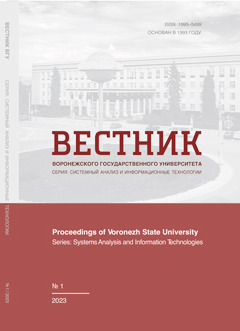
ISSN: 1995-5499
Impact-factor RSCI 2021: 0,358
Doctor of Technical Sciences, Professor (Voronezh State University)
Doctor of technical Sciences, Professor (Voronezh State University)
Candidate of technical Sciences, Associate Professor (Voronezh State University)
Doctor of Physical and Mathematical Sciences, Professor (Voronezh State University)
Corresponding Member of the Far Eastern Branch of the Russian Academy of Sciences (Institute of Engineering and Metallurgy of the Far Eastern Branch of the Russian Academy of Sciences)
Doctor of technical Sciences, Professor (Voronezh state agricultural University named after Emperor Peter the great)
Doctor of Technical Sciences, Associate Professor (Voronezh State University)
Doctor of Physical and Mathematical Sciences, Professor (Voronezh State University)
Doctor of Technical Sciences, Professor (Tambov State Technical University)
Doctor of Physical and Mathematical Sciences, Professor (Institution of Russian Academy of Sciences Dorodnicyn Computing Centre)
Doctor of Physical and Mathematical Sciences, Professor (Voronezh State University)
Doctor of Physical and Mathematical Sciences, Professor (Voronezh State University)
Doctor of Philology, Professor (Voronezh State University)
Doctor of Physical and Mathematical Sciences, Professor (Voronezh State University)
Doctor of Technical Sciencies, Professor, Head of the Department of automated and computer systems (Voronezh State Technical University)
Candidate of Physical and Mathematical Sciences, Associate Professor (Voronezh State University)
Doctor of Physical and Mathematical Sciences, Professor (Voronezh Institute of the Ministry of Internal Affairs of Russia)
Doctor of Technical Sciences, Professor (Moscow Aviation Institute (National Research University))
Doctor of Physical and Mathematical Sciences, Associate Professor (Voronezh State University)
Doctor of Technical Sciences, Professor (Voronezh State University)
Doctor of Technical Sciences, Professor (St. Petersburg Institute for Informatics and Automation of Russian Academy of Sciences)
Doctor of Technical Sciences, Professor (JSC Concern Constellation)
Nikolay Tolstykh is a renowned scientist conducting his studies in the speciality group 05.13.00. Namely, he works on the theory of conflict interactions between information and information control systems of various purposes. Their key research works focus on the development of a methodology for the analysis and assessment of the functioning of information and communication systems in the situation of information conflict. Nikolay Tolstykh is also known for his studies carried out to determine the conceptual basis of sources and causes of conflicts in automatic and automated management systems, as well as formation principles and functioning algorithms of information influence.
Nikolay Tolstykh is the founder and head of the scientific school “Methods of the information confrontation in information and communication systems of special purposes or mission critical applications”. They are the author of 430 scientific papers.
Doctor of Technical Sciences, Professor (Voronezh State University)
Doctor of Physical and Mathematical Sciences, Professor (Voronezh State University)
Doctor of Technical Sciences, Professor (“GNII PTZI FSTEC of Russia”)
Associate Professor (University Pierre Mendes-France, Grenoble II)
Dr., Prof (Martin-Luther-University Halle-Wittenberg Faculty of Natural Science II Institute of Mathematics Halle)
Dr., Prof. (University of Münster Mitglied der Nordrhein-Westfälischen Akademie der Wissenschaften)
Ph.D. in Computing Sciences and Engineering (СStanford University)

Voronezh State University, Faculty of Computer Science,
Editorial Office of «Proceedings of Voronezh State University. Series: Systems Analysis and Information Technologies»
1 University Square
Voronezh, Russian Federation 394018
+7 (473) 220-84-70
cs-it@cs.vsu.ru